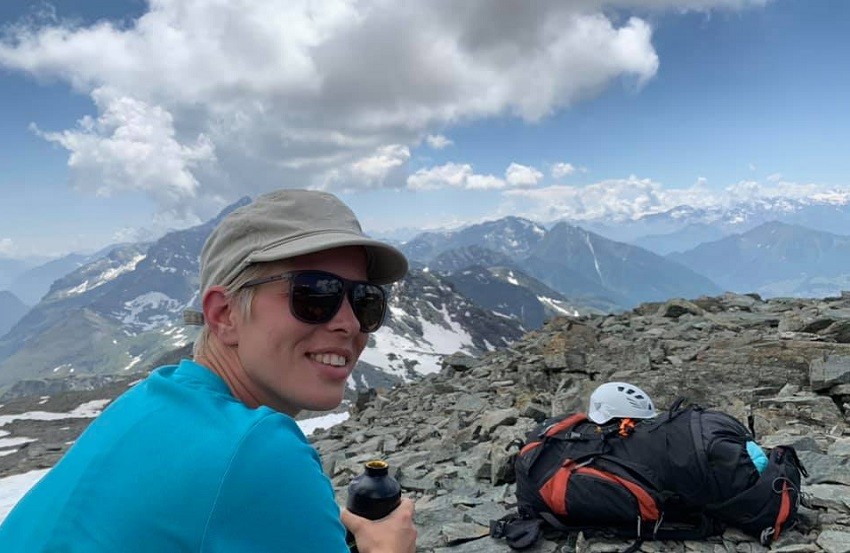Maria Krumova is one of few Bulgarians to have gone to live in Great Britain not in pursuit of an expat’s dream but for love. In the two years she has been there she has formed many attachments – to the immaculate flower gardens in the aristocratic estates, to the people whose hearts beat in tune with living nature and to… a Bulgarian folklore instrument, the kaval.
Although she has only been living in Great Britain for a short while, Maria Krumova says she has now settled in well in a village close to the town of Aylesbury. She spent the first year in isolation because of the coronavirus but is now “living life to the fullest”.
“As a matter of fact I got to know my fellow-villagers relatively quickly,” she says. “I have a dog which I take out for walks, so I constantly meet a lot of people – South Africans, but also some really interesting Brits and Bulgarians. And as our beautiful village is between Oxford and London, I go to one for folk dancing and to the other to see friends.”
Before emigrating, Maria worked in brand strategies and brand design and, as she herself puts it, she took the job along with her. In the time the pandemic restrictions were tightest she started studying garden design at the National Design Academy – because one of her hobbies is gardening, and because the most beautiful thing she has seen are the gardens. Now she combines both professions, spending part of her time as garden designer at one of the big estates here.
“I have lived in villages for eight years, but in Bulgaria I grew mostly vegetables, I wasn’t very interested in flowers,” Maria says. “Now I have a real passion for flowers and it gives me enormous pleasure to make genuine art out of them – to watch how they combine after I have planted them. I can’t wait for spring to see what all the bulbs I planted in the gardens these past weeks will look like.”

While she was living in Bulgaria, Maria Krumova was a volunteer with environmental organizations and travelled the country, camera in hand, taking pictures of many environmental atrocities, like illegal landfills.

Nevertheless, she says she is not the kind of person to say: everything is bad in Bulgaria, in England everything is wonderful.
“The big difference is not between individuals in Bulgaria and in England, it is in the community which is a powerful force here,” Maria says. “I was at a meeting in the village hall recently, which debated the municipality’s plan to plant an orchard over an area that was wasteland. But about a hundred people said they didn’t want the trees and shrubs uprooted because there are many animals and birds living in them, and now there is to be an environmental impact assessment of the place. Another example that impressed me was the construction of the new railway line that passes near our village – environmentalists spent 30 days inside a hole dug in the ground as a form of protest so the heavy machinery wouldn’t be brought here.”

To live in harmony with herself and with the world around, Maria Krumova seeks a balance. Balance in being useful to the community, and to the people near and dear to her heart, that is why she is a volunteer with the National Wildlife Trust. “You may pay taxes, but no one owes it to you to keep your street clean, you owe it to yourself, if you have any respect for yourself,” Maria says.The other way she finds a balance between heart and mind is by playing the kaval. Her first kaval teacher is from Chepelare, she met him one winter she spent in Smolyan in Bulgaria a little while before she started her new life. And she didn’t forget to take the instrument with her – to play Bulgarian folk music “to herself, and to the forest”.
Interview by Ina Nikolova, Radio Stara Zagora, BNR
Editing by Diana Tsankova
Photos: courtesy of Maria KrumovaThere is no exact statistic on the number of Bulgarians living abroad, but a report from the Ministry of Foreign Affairs from last year indicates that around 2.8 million Bulgarians are living outside the country . According to the 2021 population census..
The nature protection organization WWF - Bulgaria is launching a campaign entitled "Subscribe to Nature". The disappearance of wild animals is a series in which we play the main role. In less than one human lifetime, 73% of vertebrates in..
The Embassy of France and the French Cultural Institute brought together scientists to present their experience and the scientific challenges in Antarctica, as well as the fight against climate change. Partners of the event were the..
Nuredin Nuredinaj comes from the historical-geographical region of Gòra in Northeastern Albania, where 90% of the inhabitants identify themselves as..

+359 2 9336 661
